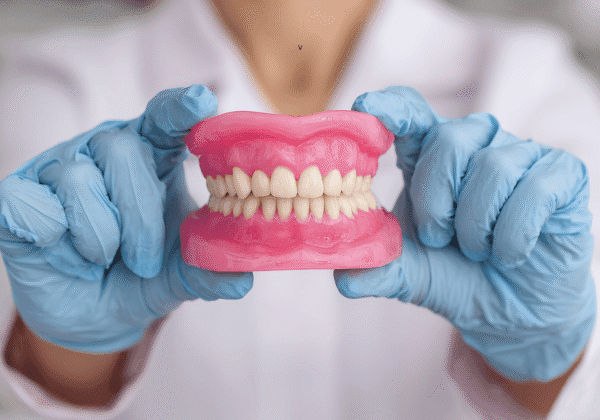The Role of Regular Dental Cleanings in Overall Health
A healthy smile begins with clean teeth and gums. Regular dental cleanings are essential for maintaining your oral health, preventing issues like cavities and gum disease, and even supporting your overall well-being. At Village Dental of New England, we emphasize the importance of routine cleanings as part of a comprehensive oral care plan. In this blog, we’ll explore why dental cleanings are so important and how they can benefit your health in more ways than one.
What Are Dental Cleanings?
Dental cleanings, also known as prophylaxis, are professional treatments designed to remove plaque, tartar, and stains from your teeth. While daily brushing and flossing are crucial, they can’t reach every area of your mouth. Professional cleanings target hard-to-reach spots and provide a deeper level of care.
Benefits of Regular Dental Cleanings
- Prevention of Cavities
Plaque, a sticky film of bacteria, is the leading cause of tooth decay. Regular cleanings remove plaque and tartar buildup, reducing your risk of cavities and maintaining strong, healthy teeth. - Protection Against Gum Disease
Gum disease begins with gingivitis, which can progress to periodontitis if untreated. Dental cleanings remove harmful bacteria and tartar from below the gumline, helping to prevent gum inflammation and infection. - Fresher Breath
Persistent bad breath, or halitosis, is often caused by bacteria and food particles trapped in the mouth. Cleanings eliminate these odor-causing agents, leaving your breath fresh and clean. - Brightens Your Smile
Dental cleanings remove surface stains caused by coffee, tea, wine, and tobacco, giving your smile a brighter, more polished appearance. - Early Detection of Issues
During a cleaning, your dentist or hygienist can identify early signs of dental problems, such as cavities, gum disease, or oral cancer. Early detection allows for less invasive and more effective treatment. - Improved Overall Health
Oral health is closely linked to overall health. Studies have shown connections between gum disease and systemic conditions like heart disease, diabetes, and respiratory infections. Maintaining good oral hygiene through regular cleanings can lower your risk of these complications.
How Dental Cleanings Work
- Initial Examination
Your hygienist will begin by examining your teeth and gums for any signs of decay, gum disease, or other issues. X-rays may be taken if necessary to evaluate areas below the surface. - Scaling
Using specialized tools, the hygienist will remove plaque and tartar from your teeth, particularly around the gumline and between teeth. This process, called scaling, is essential for preventing gum disease. - Polishing
After scaling, your teeth are polished with a high-powered brush and a gritty toothpaste. This step removes surface stains and leaves your teeth feeling smooth and clean. - Flossing
Flossing removes debris and plaque from between your teeth and ensures your gums are healthy. - Fluoride Treatment (Optional)
A fluoride treatment may be applied to strengthen your enamel and protect against cavities. This step is especially beneficial for children and adults prone to tooth decay.
How Often Should You Schedule Dental Cleanings?
Most patients benefit from professional cleanings every six months. However, those with specific conditions, such as gum disease, may require more frequent visits. Your dentist will recommend a cleaning schedule based on your individual needs.
The Link Between Oral Health and Overall Health
Your mouth is a gateway to your body, and poor oral health can contribute to serious systemic issues. Here’s how regular cleanings can benefit your overall health:
- Heart Health
Gum disease increases inflammation and bacteria in the bloodstream, which can contribute to heart disease and stroke. Regular cleanings help reduce this risk. - Diabetes Management
Diabetic patients are more prone to gum disease, which can make blood sugar levels harder to control. Keeping your teeth and gums healthy can improve diabetes management. - Pregnancy Health
Hormonal changes during pregnancy increase the risk of gum disease, which has been linked to premature birth and low birth weight. Regular cleanings are vital for expectant mothers. - Respiratory Health
Bacteria from gum infections can travel to the lungs, leading to respiratory infections or worsening existing conditions like COPD. Cleanings reduce harmful bacteria in the mouth.
Maintaining Oral Hygiene Between Visits
While professional cleanings are essential, maintaining good oral hygiene at home is equally important. Follow these tips to keep your teeth and gums healthy between visits:
- Brush Twice Daily
Use a fluoride toothpaste and a soft-bristled toothbrush to clean your teeth and gums effectively. Replace your toothbrush every 3-4 months or sooner if the bristles are frayed. - Floss Daily
Flossing removes plaque and food particles from between your teeth and along the gumline, preventing decay and gum disease. - Use Mouthwash
An antibacterial mouthwash helps reduce bacteria and freshens your breath. Look for one with the ADA seal of approval. - Eat a Balanced Diet
Limit sugary and acidic foods that can erode enamel and contribute to cavities. Include plenty of fruits, vegetables, and calcium-rich foods for strong teeth. - Stay Hydrated
Drinking water helps rinse away food particles and bacteria while keeping your mouth hydrated.
Why Choose Village Dental of New England for Dental Cleanings?
At Village Dental, we take pride in providing thorough and gentle cleanings tailored to your needs. Our experienced team uses the latest tools and techniques to ensure your teeth are as clean and healthy as possible. We’re dedicated to helping you maintain a bright smile and prevent future dental issues.
FAQs About Dental Cleanings
Q: Are dental cleanings painful?
A: Most cleanings are painless. If you experience discomfort, it may be due to tartar buildup or sensitive gums, and your hygienist can adjust the treatment to ensure your comfort.
Q: How long does a dental cleaning take?
A: A typical cleaning appointment lasts 30-60 minutes, depending on the condition of your teeth and gums.
Q: Is fluoride treatment necessary?
A: While not mandatory, fluoride treatments provide added protection against cavities and are especially beneficial for those prone to decay.
Q: Can cleanings remove deep stains?
A: Professional cleanings remove surface stains, but deep intrinsic stains may require additional treatments like professional teeth whitening.
Schedule Your Next Cleaning Today
Regular dental cleanings are the foundation of a healthy smile and the key to preventing costly oral health issues. At Village Dental of New England, we’re committed to helping you achieve and maintain optimal oral health. Contact us today to schedule your next cleaning and experience the benefits of professional care.



